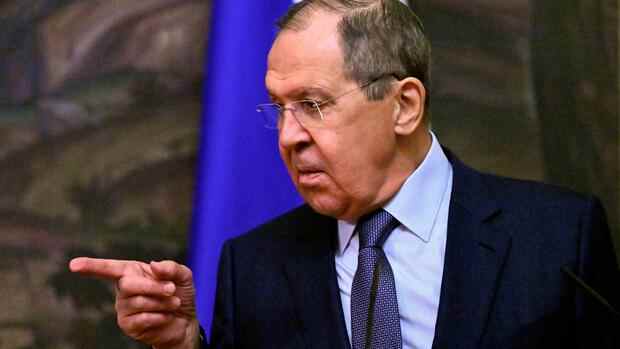India is one of the few major economies that has not explicitly condemned Russia’s war of aggression in Ukraine.
(Photo: dpa)
Bangkok When top foreign diplomats visit, it’s usually not a compelling reason for India’s Prime Minister Narendra Modi to clear his schedule. British Foreign Secretary Liz Truss had to be content with meeting her Indian counterpart during her trip to Delhi on Thursday.
In the case of Russia’s Foreign Minister Sergei Lavrov, who was touring the Indian capital a day later, Modi did not want to miss the opportunity to personally receive the guest: their conversation is scheduled for late Friday afternoon local time.
Modi’s welcoming gesture is highly symbolic: despite the pressure from the West, India wants to continue its close ties with Russia.
India is one of the few major economies that has not explicitly condemned Russia’s war of aggression in Ukraine. Instead of participating in sanctions, the Modi government wants to use the situation to buy oil from Russia at a preferential price. India vehemently rejects criticism from Europe and America.
Top jobs of the day
Find the best jobs now and
be notified by email.
In Delhi, Lavrov was visibly pleased at the opportunity to counter the image of Russia’s international isolation. At the beginning of his talks in the Indian capital, he announced that he was bringing the best wishes of his President Vladimir Putin, and praised India’s response to the Ukraine war so far: “We appreciate that India is looking at this situation from the full perspective and not just one-sidedly,” he said. he said.
India’s attitude is met with incomprehension in the West
The Indian government sees itself as neutral in the conflict – and has abstained in the UN Security Council and the UN General Assembly when it came to resolutions denouncing Russia’s behavior. In the West, the attitude of India, which is otherwise often seen as a like-minded democracy, met with incomprehension. US President Joe Biden described the country’s position as “shaky” on a united international response to Russia’s aggression.
>> Read also: Putin’s war reveals the dilemma of the fossil world order
So far, however, India is not prepared to distance itself from Russia. Indian Foreign Minister Subrahmanyam Jaishankar again refrained from criticizing Russia’s behavior in a brief public address before the start of his talks with Lavrov. He pointed out only abstractly that the meeting was taking place in a “difficult international environment”.
Without going directly to Ukraine, he added that India is always committed to responding to differences and conflicts through dialogue and diplomacy. In writing, India reiterated its call for an end to violence in Ukraine – but this was not aimed directly at Russia.
India sees itself as a neutral authority in the Ukraine war.
(Photo: IMAGO/AAP)
From the Indian government’s point of view, maintaining a good basis for discussion with the Kremlin is more important than being perceived as a loyal partner by the West. Prime Minister Modi wants to prevent Russia from becoming too closely tied to India’s rival China. At the same time, Russia is still the most important armaments supplier for India’s army – and the government in New Delhi is pressing for the Russian delivery of the S-400 missile defense system to be completed as planned, despite the Ukraine war.
Modi buys Russian oil at a bargain price
Modi now sees an additional opportunity for lucrative energy contracts: while the West is looking for ways to reduce imports from Russia, India is expanding its purchases. Since Russian troops invaded Ukraine, the country has purchased 13 million barrels of oil from Russia – almost as much as in all of last year.
Business is evidently being driven by significant price reductions that Russia is currently granting Indian oil companies. Both countries are currently working on a new payment mechanism to secure future transactions that are currently not subject to sanctions. This should enable transactions directly in Indian rupees and Russian rubles without going through the US dollar.
US Commerce Secretary Gina Raimondo called the plans “deeply disappointing” and told the Indian government it was time “to be on the right side of history” and “not to fund President Putin’s war”. The federal government was also irritated: They do not want to see a situation in which sanctions would be circumvented and a friendly country would try “to derive an economic advantage from the war,” said Jens Plötner, Chancellor Olaf Scholz’s foreign and security policy adviser. this week on a visit to Delhi.
In India, the West is accused of using double standards. “If you look at the main buyers of oil and gas from Russia, you will see that most of them are based in Europe,” Foreign Minister Jaishankar said at a discussion with his British counterpart Truss on Thursday.
In contrast to the Europeans, India obtains less than one percent of its energy requirements from Russia. Jaishankar also does not want to be accused of profiting from the crisis: “When oil prices rise, it is quite natural to look around the market for good offers,” he said.
Lavrov obviously liked these statements: “We will be ready to supply India with any goods that it wants to buy from us,” he said at a press conference in Delhi.
More: Putin’s Last Friends – These countries condone or support aggressive war.
